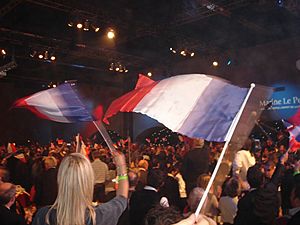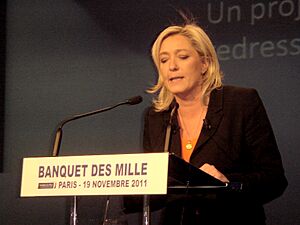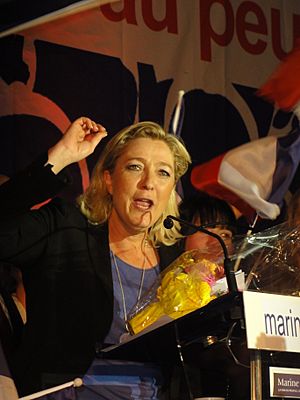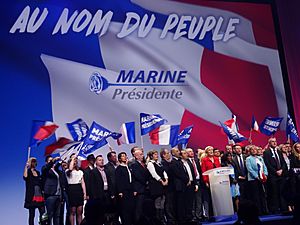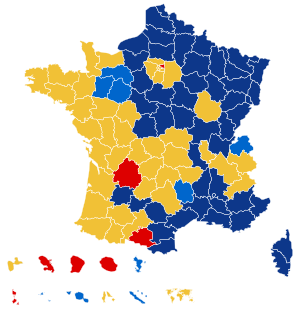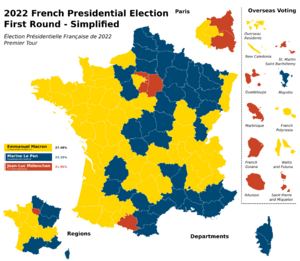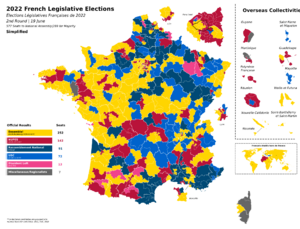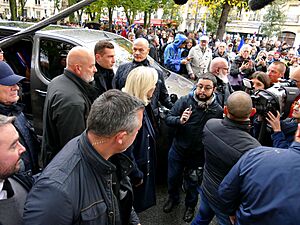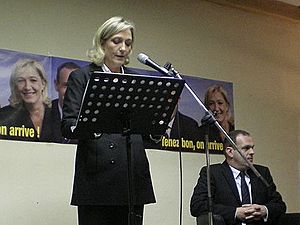Marine Le Pen facts for kids
Quick facts for kids
Marine Le Pen
|
|
|---|---|
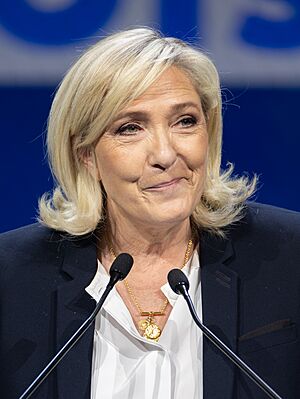
Le Pen in 2025
|
|
| Leader of the National Rally in the French National Assembly |
|
| Assumed office 28 June 2022 |
|
| Preceded by | Office established |
| Member of the National Assembly for Pas-de-Calais's 11th constituency |
|
| Assumed office 18 June 2017 |
|
| Preceded by | Philippe Kemel |
| President of the National Rally | |
| In office 16 January 2011 – 12 September 2021 |
|
| Vice President | Alain Jamet Louis Aliot Marie-Christine Arnautu Jean-François Jalkh Florian Philippot Steeve Briois Jordan Bardella |
| Preceded by | Jean-Marie Le Pen |
| Succeeded by | Jordan Bardella |
| Chair of the Europe of Nations and Freedom group | |
| In office 15 June 2015 – 19 June 2017 Serving with Marcel de Graaff
|
|
| Preceded by | Office established |
| Succeeded by | Nicolas Bay |
| Member of the European Parliament | |
| In office 14 July 2009 – 18 June 2017 |
|
| Constituency | North-West France |
| In office 20 July 2004 – 13 July 2009 |
|
| Constituency | Île-de-France |
| Regional Councillor | |
| In office 4 January 2016 – 2 July 2021 |
|
| Constituency | Hauts-de-France |
| In office 26 March 2010 – 13 December 2015 |
|
| Constituency | Nord-Pas-de-Calais |
| In office 28 March 2004 – 21 March 2010 |
|
| Constituency | Île-de-France |
| In office 21 March 1998 – 28 March 2004 |
|
| Constituency | Nord-Pas-de-Calais |
| Personal details | |
| Born |
Marion Anne Perrine Le Pen
5 August 1968 Neuilly-sur-Seine, France |
| Political party | RN (since 1986) |
| Spouses |
Franck Chauffroy
(m. 1995; div. 2000)Eric Lorio
(m. 2002; div. 2006) |
| Domestic partner | Louis Aliot (2009–2019) |
| Children | 3 |
| Parents |
|
| Relatives | Marie-Caroline Le Pen (sister) Marion Maréchal (niece) Philippe Olivier (brother-in-law) Jordan Bardella (nephew-in-law) Vincenzo Sofo (nephew-in-law) |
| Alma mater | Panthéon-Assas University (LLM, DEA) |
| Signature |  |
Marine Le Pen (born 5 August 1968) is a French lawyer and politician. She led the National Rally party (RN) from 2011 to 2021. She has run for the French presidency three times: in 2012, 2017, and 2022. Since 2017, she has been a member of the National Assembly for the 11th constituency of Pas-de-Calais. Since June 2022, she has been the leader of the National Rally group in the Assembly.
Le Pen is the youngest daughter of Jean-Marie Le Pen, who used to lead the party. She joined the National Front (FN), now called National Rally, in 1986. She has held various political roles, including regional councillor and Member of European Parliament. In 2011, she became the leader of the FN, taking over from her father. She aimed to make the party more appealing to a wider range of voters.
In the 2012 presidential election, she came in third place. In 2017, she reached the second round but lost to Emmanuel Macron. She ran again in 2022, making it to the second round once more, but again lost to Macron. Le Pen has worked to change her party's image, removing some members accused of racism. She even expelled her father from the party in 2015. She supports strong rules against immigration and favors protecting French businesses. She is against globalization and multiculturalism.
Time magazine recognized Le Pen as one of the 100 most influential people in the world in 2011 and 2015. In 2016, Politico named her the second-most influential MEP. In January 2024, she became the most popular politician in France for the first time.
In March 2025, Le Pen and others were found guilty of misusing European Parliament funds. She was sentenced to four years in prison and banned from running for political office for five years. This means she cannot run in the 2027 French presidential election.
Contents
- Early Life and Education
- Early Political Career
- Leading the National Front/National Rally (2011–2022)
- Changing the Party's Image
- First Steps as a New Leader
- First Presidential Campaign (2011–2012)
- Election Results (2012–2016)
- Second Presidential Campaign (2016–2017)
- Member of the National Assembly: 2017–Present
- Third Presidential Campaign and Legislative Election (2022)
- Stepping Down as Party Leader
- Political Views
- Elections Contested
- Political Roles
- Personal Life
- See also
Early Life and Education
Growing Up and Family
Marine Le Pen was born on 5 August 1968 in Neuilly-sur-Seine, France. She is the youngest of three daughters of Jean-Marie Le Pen, a politician, and his first wife, Pierrette Le Pen. When Marine was eight, a bomb exploded near her family's apartment. Luckily, Marine and her family were not hurt.
Her mother left the family in 1984 when Marine was 16. Le Pen later wrote that this was a very painful time for her. Her parents divorced in 1987.
Studying and Working as a Lawyer
Le Pen studied law at Panthéon-Assas University. She earned a Master of Laws degree in 1991 and another advanced degree in criminal law in 1992. She worked as a lawyer for six years, from 1992 to 1998. She often defended people in criminal court. In 1998, she joined the legal team of the National Front party.
Early Political Career
Joining the National Front
Le Pen joined the National Front (FN) in 1986 when she was 18 years old. Her first political role was in 1998 when she was elected as a Regional Councillor for Nord-Pas-de-Calais. In the same year, she started leading the FN's legal department.
In 2000, she became the president of "Generations Le Pen." This group aimed to make the National Front seem less extreme. She also became a member of the FN's Executive Committee in 2000 and a vice-president in 2003.
In 2006, she helped manage her father's presidential campaign. In 2007, she became one of the two executive vice-presidents of the FN, focusing on training and communication.
Campaigning for Party Leadership
In early 2010, Le Pen announced she wanted to become the leader of the FN. She hoped to make the party a "big popular party" that would appeal to all French people. She officially started her campaign in September 2010. She traveled across France, meeting with party members.
During her campaign, she said that the FN leader should be the party's candidate for the 2012 presidential election. Many important figures in the party, including her father, supported her. She also tried to distance herself from some of her father's controversial statements to improve the party's image.
In January 2011, Marine Le Pen was elected as the new president of the FN. She won with 67.65% of the votes. Her father, Jean-Marie Le Pen, became the honorary chairman.
Leading the National Front/National Rally (2011–2022)
Changing the Party's Image
As leader, Marine Le Pen worked to "de-demonize" her party. This meant trying to change its image from being seen as extreme. She wanted to make the party more appealing to more voters. This included changing some of the party's policies and removing members who caused controversy. In 2015, she even expelled her own father from the party.
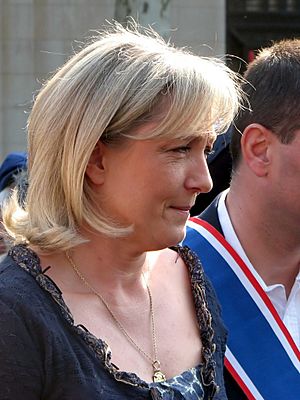
Le Pen said her goal was not to change the party's core ideas, but to show them as they truly are. She believes the media often gives the National Front an unfair image. She does not like the term "far-right" or "extreme-right" for her party.
In 2014, Foreign Policy magazine recognized her for "renovating the image" of her party. At a European level, she avoided alliances with very extreme right-wing parties. Her allies in other countries also officially condemned antisemitism.
First Steps as a New Leader
As president of the National Front, Marine Le Pen became an important member of the party's main committees. In her first speech as leader in January 2011, she talked about strengthening France and using direct democracy. She also criticized the "Europe of Brussels," saying it harmed public services and jobs.
In May 2011, she gave her first major speech to 3,000 supporters. In September 2011, she spoke about immigration, security, and the economy. She also strongly opposed giving foreigners the right to vote. She often held press conferences to discuss French, European, and international issues.
First Presidential Campaign (2011–2012)
In May 2011, the FN Executive Committee approved Marine Le Pen's presidential candidacy. She officially launched her campaign in Nice in September 2011. Her campaign focused on themes like French independence, Europe, re-industrialization, family, education, and immigration. She also talked about reducing France's debt.
Many people noticed that she focused more on economic and social issues, rather than just immigration or law and order, which were traditional FN topics. In March 2012, she gathered enough signatures to officially run for president.
In the first round of the 2012 election on 22 April, she received 17.90% of the votes, coming in third place. This was a better result than her father had achieved in the 2002 election. She performed best in eastern France and in some rural areas.
On 1 May 2012, Le Pen announced that she would not support either of the two candidates in the second round. She said she would cast a blank vote and told her supporters to vote with their conscience.
Election Results (2012–2016)
After her strong showing in the 2012 presidential election, Le Pen formed an election group called the "Blue Marine Gathering." In the June 2012 parliamentary elections, she ran in Pas-de-Calais' 11th constituency. She won 42.36% of the vote in the first round but lost in the second round. Nationally, two FN members were elected to parliament: her niece Marion Maréchal and Gilbert Collard.
In 2014, the FN made more gains in local and senatorial elections. For the first time, the FN had members in the upper house of parliament. In the 2014 European elections, the FN received the most votes in France, with 24.90%. Le Pen herself came in first in her constituency. 25 FN representatives were elected to the European Parliament.
In April 2015, her father made some controversial statements, leading to a crisis within the FN. Marine Le Pen organized a vote to expel him from the party he had founded. In August, the FN's executive office voted to remove him.
In the 2015 regional elections, Le Pen ran for president of the regional council of Hauts-de-France. She finished first in the first round with 40.6% of the vote. However, the Socialist candidate withdrew and supported her opponent, who then won.
Second Presidential Campaign (2016–2017)
Marine Le Pen announced her candidacy for the 2017 French presidential election in April 2016. Her party faced challenges in finding money for the campaign, borrowing from a Russian bank in 2014.
Experts believed her strong position in polls was due to her clear leadership and events like the migrant crisis and terrorist attacks in France. She said that Donald Trump's victory in the US presidential election would help her. Le Pen officially launched her campaign in February 2017, promising a vote on France's membership in the European Union if she couldn't achieve her goals through talks.
In March 2017, the European Parliament removed her immunity from prosecution for tweeting violent images. She also faced investigation for allegedly misusing EU funds. Le Pen met with several world leaders, including Vladimir Putin of Russia.
In the first round of the election on 23 April 2017, Le Pen won 21.3% of the vote, coming in second place behind Emmanuel Macron. This meant they would face each other in the final round. The day after the first round, Le Pen announced she would temporarily step down as FN leader to try and unite voters.
During the final debate, her performance was widely criticized. On 7 May, she lost to Emmanuel Macron, receiving 33.9% of the vote. She immediately announced a "full transformation" of the FN.
Member of the National Assembly: 2017–Present
On 18 May 2017, Le Pen announced she would run for parliament in the Pas-de-Calais's 11th constituency. She won the seat with almost 58% of the vote. She then resigned as a Member of the European Parliament.
In 2019, it was reported that Le Pen no longer wanted France to leave the European Union or the euro currency. Instead, she and her party aimed to change the EU from within. In July 2021, she was re-elected to lead the National Rally without opposition.
Third Presidential Campaign and Legislative Election (2022)
In January 2020, Le Pen announced her third run for president in the 2022 French presidential election. She launched her campaign in January 2022.
In the first round of the election, Le Pen came in second with 23.15% of the votes. She participated in a televised debate against Macron. She was defeated by Emmanuel Macron in the second round on 24 April, receiving 41.45% of the votes. This was the highest vote share for a nationalist candidate in French history.
Soon after, in the 2022 French legislative election, she led her party to win its highest number of seats in the National Assembly. The National Rally became the largest opposition party in Parliament. Days later, she was elected leader of the parliamentary National Rally party, a position she still holds.
Stepping Down as Party Leader
In November 2022, Marine Le Pen stepped down from chairing the National Rally party. Jordan Bardella, who had been the party's interim leader during her presidential campaign, took over as her successor.
Political Views
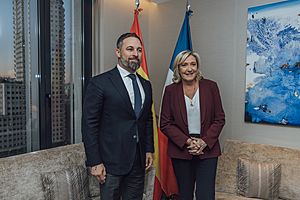
Immigration and Society
Marine Le Pen and the National Rally believe in strict rules about immigration. They think that multiculturalism has not worked well in France. Le Pen has called for a pause on legal immigration. She would also change laws that allow undocumented immigrants to become legal residents. She believes that benefits for immigrants should be reduced to discourage new arrivals. After the European migrant crisis, she called for France to leave the Schengen Area and bring back border checks.
She supports rules on certain food practices. Le Pen participated in the March for the Republic and Against Antisemitism in Paris in November 2023. This march was in response to an increase in antisemitism since the start of the Gaza war.
Economic Ideas
On energy, Le Pen wants France to be independent, focusing on nuclear and hydroelectric power. She is against wind energy because it can be unreliable and affects the landscape. She proposes stopping new wind energy projects and eventually removing existing wind turbines. Le Pen supports protectionism to protect French businesses from foreign competition. She favors an active role for the government in the economy. She is against globalization and the selling off of public services.
Le Pen is against European Union supranationalism and wants a looser 'Europe of the Nations'. As of 2019, she no longer wants France to leave the EU or the euro currency. Instead, she wants to change the EU from the inside. She has been a strong opponent of the Treaty of Lisbon. She is also against EU membership for Turkey and Ukraine.
Foreign Relations
Le Pen has criticized the Turkish President Recep Tayyip Erdoğan. She also criticized France's close ties with countries like Qatar and Saudi Arabia, saying they support certain groups. She wants closer ties with the United Arab Emirates and Egypt, which she says fight against extremism. She believes Ukraine has been too influenced by the United States. She has criticized NATO's policies in the region.
In response to the 2022 invasion of Ukraine, Le Pen criticized Russia's actions, despite her past support for Russia. She supported welcoming Ukrainian refugees. She has stated that if elected, she would remove France from NATO's military command. In October 2023, she condemned Hamas' actions during the Gaza war and supported Israel's right to defend itself. In May 2024, she met with an Israeli government minister for the first time.
Other Topics
Le Pen says she is a feminist because she defends women's rights. However, she criticizes what she calls "neo-feminism," which she sees as women fighting against men.
Elections Contested
European Elections
In the 2004 European Parliament election, Le Pen led the FN list in the Île-de-France area. Her list won one seat.
In the 2009 European Parliament election, Le Pen led the FN list in the North-West France area. Her party received the highest FN vote share in French constituencies and won one seat.
Parliamentary Elections
Paris in 1993
Le Pen first ran for parliament in the 1993 legislative election in Paris. She finished third.
Lens in 2002
She ran in the 2002 election in Pas-de-Calais' 13th constituency, Lens. She made it to the second round but lost.
Hénin-Beaumont in 2007
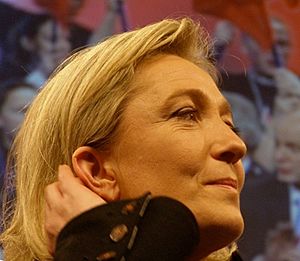
In the 2007 election, Le Pen ran in Pas-de-Calais' 14th constituency, Hénin-Beaumont. She finished second in the first round and was the only FN candidate to reach the second round. She lost in the second round.
Hénin-Beaumont in 2012
In the 2012 election, Le Pen ran in Pas-de-Calais' 11th constituency. She finished first in the first round but was defeated in the second round.
Hénin-Beaumont in 2017
In the 2017 French legislative election, Le Pen ran again in Pas-de-Calais' 11th constituency. She won the seat in the second round.
Hénin-Beaumont in 2022
In the 2022 French legislative election, Le Pen ran for re-election in Pas-de-Calais' 11th constituency. She won the seat again in the second round.
Hénin-Beaumont in 2024
Le Pen ran for re-election in Pas-de-Calais' 11th constituency in the 2024 French legislative election.
Regional Elections
Nord-Pas-de-Calais in 1998
In the 1998 elections, she became a regional councillor for Nord-Pas-de-Calais for six years.
Île-de-France in 2004
In the 2004 elections, she led the FN regional list in Île-de-France. Her list won fifteen councillors. She led the regional group for five years.
Nord-Pas-de-Calais in 2010
In the 2010 elections, Marine Le Pen led the FN regional list in Nord-Pas-de-Calais. Her list finished in third position. Her success in these elections strengthened her position within the FN.
Municipal Elections
Hénin-Beaumont in 2008
In the 2008 municipal elections in Hénin-Beaumont, the FN list, with Le Pen in second position, came second. They won five councillors.
2009 Hénin-Beaumont By-election
A special municipal election was held in Hénin-Beaumont in 2009. The FN list, again with Le Pen, led in the first round. They received 47.62% in the second round, winning eight councillors, but did not win control of the town. In February 2011, Le Pen resigned as a municipal councillor.
Political Roles
Local Roles
- Regional councillor of Nord-Pas-de-Calais: 1998–2004; 2010–2015.
- Regional councillor of Île-de-France: 2004–2010.
- Municipal councillor of Hénin-Beaumont: 2008–2011.
European Roles
- Member of the European Parliament for Île-de-France: 2004–2009.
- Member of the European Parliament for North-West France: 2009–2017.
Personal Life
In 1995, Le Pen married Franck Chauffroy, a business executive. They had three children: Jehanne, Louis, and Mathilde. They divorced in 2000. In 2002, she married Eric Lorio, a former National Front official. They divorced in 2006.
From 2009 to 2019, she was in a relationship with Louis Aliot, who was a vice president of the National Front. She lives in La Celle-Saint-Cloud with her three children. She also owns a house with Aliot in Millas. Le Pen describes herself as a Catholic who does not regularly attend church.
See also
 In Spanish: Marine Le Pen para niños
In Spanish: Marine Le Pen para niños
 | Leon Lynch |
 | Milton P. Webster |
 | Ferdinand Smith |


